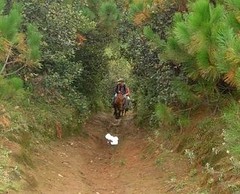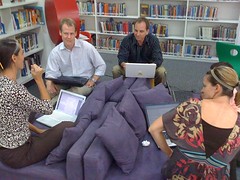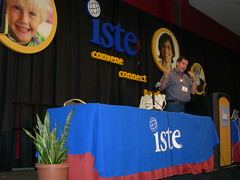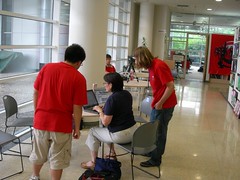The other day Jeff and I were streaming the radio, listening to the “Top 40 Countdown” from the USA. The host is none other than American Idol’s Ryan Seacrest; having been out of the states for so long, we hadn’t known that was one of his ‘other jobs’! As we’re streaming the show, Ryan asks a question of his listeners and tells them to ‘Twitter your response back’. Jeff and I both stopped what we were doing (painting the living room) and looked at each other in surprise. When did Twittering become a routine part of radio shows?
 I was catching up on my news stories a few days ago and came across an article about people who were charged astronomical amounts on their cell phone bills. In each incident, the person being charged the exorbitant amount was being ‘connected’ in some way. One gentleman was downloading a movie while on holiday, another man was streaming a football game while on a cruise. A young girl was secretly sending 100s of text messages a day to her friends, and yet another gentleman was stationed in a remote area in Canada and decided to use his cell phone as a modem…$83,000 USD later he realized it wasn’t such a great idea!
I was catching up on my news stories a few days ago and came across an article about people who were charged astronomical amounts on their cell phone bills. In each incident, the person being charged the exorbitant amount was being ‘connected’ in some way. One gentleman was downloading a movie while on holiday, another man was streaming a football game while on a cruise. A young girl was secretly sending 100s of text messages a day to her friends, and yet another gentleman was stationed in a remote area in Canada and decided to use his cell phone as a modem…$83,000 USD later he realized it wasn’t such a great idea!
On Sunday we decided to order pizza for delivery (too hot to cook!). We now don’t pick up the phone, we pop open the laptop. We input our order (including what toppings we want added and removed) and hit submit. Approximately 30 minutes later our pizza is delivered to our door.
 I discovered the other day that my very good friend was fighting off a bad case of pneumonia. I also read that her mom, who lives in Arizona, had fallen and needed to get staples in a gash on her head. I learned of this all through Twitter. My friend learned about her mom’s accident via twitter as well.
I discovered the other day that my very good friend was fighting off a bad case of pneumonia. I also read that her mom, who lives in Arizona, had fallen and needed to get staples in a gash on her head. I learned of this all through Twitter. My friend learned about her mom’s accident via twitter as well.
Last week I called my mom in Washington State on her cell phone via Skype from Bangkok. While I was talking to my mom on the phone, I was chatting on Skype with my best friend who works in Shanghai. At the same time, I was sending text messages to my sister’s cell phone in the states via my email account.
This brings me to the question ‘what makes the web so powerful?’…I believe it is connections: whenever, wherever, with whomever. We have the ability to connect to anyone and everyone all of the time. I’ve only been routinely using the Internet for about the last ten years or so, but even I feel a sense of ‘emptiness’ when the Internet is down (don’t tell Jeff!). When I’m unable to get a signal on my cell phone, I suddenly feel cut off from the world, yet I can remember a time when hardly anyone had cell phones. I’m not sure when this switch happened, but it did happen. We’ve entered this digitally connected world and I don’t think there is any turning back. Whether we like this ability to ‘constantly connect’ or not, it is a part of this world we are now living in. I have to admit, rather reluctantly, that I am one of those people who likes the ability to be connected…often. But I still am holding out against getting an iPhone, one per family is enough I think!
 In this day and age, I think as a school we are doing students a serious disservice if we are not teaching them about online safety, responsibility online, and ethical Internet use. Ideally, kids would be getting these digital literacy skills from home (and many are I’m sure). However, with the rate of change and the speed at which information is evolving, I believe educational institutions need to shoulder much of the burden for helping students to understand their digital world. Realistically, many parents are ill equipped to support and guide their children because they themselves lack the skills and information. Maybe helping parents to learn and understand digital literacy is also something that schools should be considering.
In this day and age, I think as a school we are doing students a serious disservice if we are not teaching them about online safety, responsibility online, and ethical Internet use. Ideally, kids would be getting these digital literacy skills from home (and many are I’m sure). However, with the rate of change and the speed at which information is evolving, I believe educational institutions need to shoulder much of the burden for helping students to understand their digital world. Realistically, many parents are ill equipped to support and guide their children because they themselves lack the skills and information. Maybe helping parents to learn and understand digital literacy is also something that schools should be considering. Within an educational institution, whose job is it to make sure this information is being taught to students? I don’t know if I have the answer to that…my hope is that it’s everyone’s responsibility to be teaching these skills. Yet my worry is that if it’s everyone’s job, then who is held accountable to ensure it is happening? Where are the standards and benchmarks in our curriculum for these digital literacy skills? As a counselor, I know I feel responsible for ensuring my students are gaining the skills required to be successful in life. In this life, they need to be equipped to navigate the digital world. So, I guess it’s my job too.
Within an educational institution, whose job is it to make sure this information is being taught to students? I don’t know if I have the answer to that…my hope is that it’s everyone’s responsibility to be teaching these skills. Yet my worry is that if it’s everyone’s job, then who is held accountable to ensure it is happening? Where are the standards and benchmarks in our curriculum for these digital literacy skills? As a counselor, I know I feel responsible for ensuring my students are gaining the skills required to be successful in life. In this life, they need to be equipped to navigate the digital world. So, I guess it’s my job too. In reading different articles and blog posts surrounding copyright laws, I’ve noticed a couple of reoccurring themes. Primarily “I am not a lawyer” appears often when well known bloggers are offering up opinions/advice about copyright. Additionally, answers about copyright are ambiguous and vague…it seems that there are no fast and hard answers when it comes to this issue. Often people trying to ‘do the right thing’ are frustrated and left without a clear answer of what that ‘right thing’ is when it comes to using copyrighted material.
In reading different articles and blog posts surrounding copyright laws, I’ve noticed a couple of reoccurring themes. Primarily “I am not a lawyer” appears often when well known bloggers are offering up opinions/advice about copyright. Additionally, answers about copyright are ambiguous and vague…it seems that there are no fast and hard answers when it comes to this issue. Often people trying to ‘do the right thing’ are frustrated and left without a clear answer of what that ‘right thing’ is when it comes to using copyrighted material. The concept of privacy is something that I have found myself thinking about quite a bit lately. Interestingly,
The concept of privacy is something that I have found myself thinking about quite a bit lately. Interestingly,  Living in China, we were witnesses firsthand to the arguments between couples on the streets and in the parks. At first we found this confusing, then we realized that being out in public probably afforded them more privacy than in their tiny, crowded homes! It also made me realize that not so long ago in America, people probably also went outside their homes to have a ‘private’ conversation. So when did we start making that switch, and why? When did we start moving towards this idea of privacy and a right to have our information and business kept to ourselves when historically, it would seem, it was anything but like this?
Living in China, we were witnesses firsthand to the arguments between couples on the streets and in the parks. At first we found this confusing, then we realized that being out in public probably afforded them more privacy than in their tiny, crowded homes! It also made me realize that not so long ago in America, people probably also went outside their homes to have a ‘private’ conversation. So when did we start making that switch, and why? When did we start moving towards this idea of privacy and a right to have our information and business kept to ourselves when historically, it would seem, it was anything but like this? A friend sent me a bumper sticker on Facebook that read, “Do you ever look at a picture of yourself and see a stranger in the background? It makes you wonder how many people have pictures of you.” While I laughed upon reading the silly message, I also found myself a little disturbed.
A friend sent me a bumper sticker on Facebook that read, “Do you ever look at a picture of yourself and see a stranger in the background? It makes you wonder how many people have pictures of you.” While I laughed upon reading the silly message, I also found myself a little disturbed.  In my head I’m singing “back in the saddle again!” Here I go again…I can’t say that I missed writing on my blog during my few weeks of respite between
In my head I’m singing “back in the saddle again!” Here I go again…I can’t say that I missed writing on my blog during my few weeks of respite between 
 Something has stuck with me for the last few weeks and I feel the need to vent it out…maybe that’s what a blog is for!??!
Something has stuck with me for the last few weeks and I feel the need to vent it out…maybe that’s what a blog is for!??! How in the world can we be turning out brand spanking new teachers that have never experimented with these tools in their training? How can any higher education program claim to be training 21st Century Teachers and yet still be graduating students with little to no exposure of current trends in technology? The university he graduated from has one of the best reputations for an education program in the entire state…how is this disconnect happening?
How in the world can we be turning out brand spanking new teachers that have never experimented with these tools in their training? How can any higher education program claim to be training 21st Century Teachers and yet still be graduating students with little to no exposure of current trends in technology? The university he graduated from has one of the best reputations for an education program in the entire state…how is this disconnect happening? “In the past few years, the preservice teacher education programs have made substantial progress in preparing future teachers in information technology, but they still have a long way to go”
“In the past few years, the preservice teacher education programs have made substantial progress in preparing future teachers in information technology, but they still have a long way to go” Sadly, this article was published exactly 10 years ago…seems maybe not enough people read it, or believed it! I keep finding myself becoming discouraged and disheartened. When will education put its foot to the accelerator? What will it take to get future educators prepared and in the driver’s seat? How do we get this car in gear???
Sadly, this article was published exactly 10 years ago…seems maybe not enough people read it, or believed it! I keep finding myself becoming discouraged and disheartened. When will education put its foot to the accelerator? What will it take to get future educators prepared and in the driver’s seat? How do we get this car in gear??? I am finding myself contemplating the future of education and wondering where it’s going. I know where I think it should be headed, where I’d like it to be going…yet, somehow I don’t know if it will get there.
I am finding myself contemplating the future of education and wondering where it’s going. I know where I think it should be headed, where I’d like it to be going…yet, somehow I don’t know if it will get there. This was something I encountered at the
This was something I encountered at the  “But resisting today’s digital technology will be truly lethal to our children’s education.”
“But resisting today’s digital technology will be truly lethal to our children’s education.” As
As